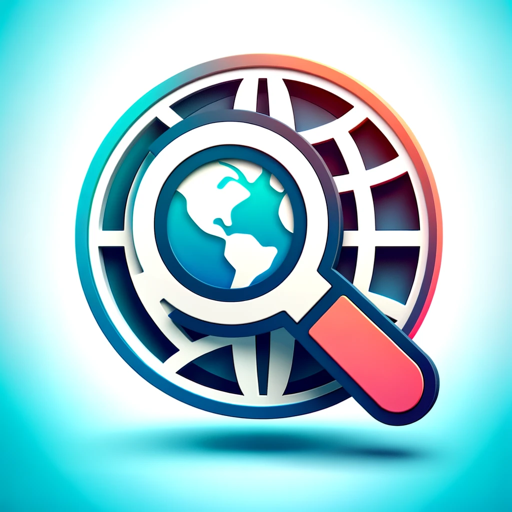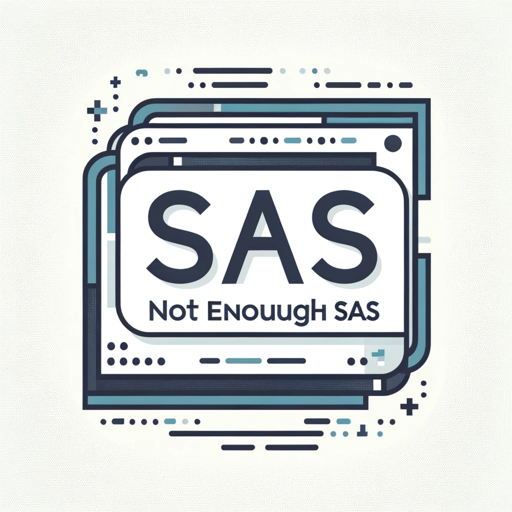WHOIS Helper-domain registration lookup tool.
AI-powered domain insights at your fingertips.
What information can you give me about this domain?
Tell me about the registrar of this domain.
When does this domain expire?
Who is the registrant for this domain?
Related Tools
Load More
Domain Name Generator & Availability Checker
Get AI to generate some domain name ideas for your product/service/business and look up availability and price

Web Dev Guru
Assists in various areas of software engineering, from design and architecture to specific programming paradigms and methodologies. Its goal is to offer concise, actionable advice, primarily focused on JavaScript and TypeScript implementations, aligning w

Domain Name Checker
Friendly assistant for DNS domain availability checks.

SPL Search - Helper
I'm here to help you with Splunk SPL searches

DMARC Guru
Checks SPF, DMARC, DKIM, and BIMI records for domains using DNS API. Analyzes DMARC reports

SearchHelper
Advanced search, rephrase, and summary assistant
20.0 / 5 (200 votes)
Introduction to WHOIS Helper
WHOIS Helper is a specialized tool designed to provide users with detailed domain registration information through WHOIS lookups. The core purpose of WHOIS Helper is to deliver accurate, real-time data about the ownership, registration status, expiration dates, and DNS records of a domain. This information can be used for various purposes like verifying domain legitimacy, conducting research on domain names, or managing domain-related issues. For example, a business considering purchasing a domain can use WHOIS Helper to check if the domain is already registered and find out when it will expire, offering insight into when it may become available again.

Main Functions of WHOIS Helper
Domain Ownership Lookup
Example
WHOIS Helper can retrieve details about who owns a particular domain name, including the registrant's name, organization (if public), and contact details.
Scenario
A cybersecurity professional investigating a phishing site may want to identify the owner of the domain to report malicious activity.
Registration and Expiration Date Retrieval
Example
It provides accurate information on when a domain was registered and when it will expire.
Scenario
A domain investor might use WHOIS Helper to monitor when valuable domain names are set to expire so they can attempt to acquire them after expiration.
DNS and Name Server Information
Example
WHOIS Helper gives detailed information about the DNS and name servers associated with a domain.
Scenario
A web administrator troubleshooting connectivity issues might use WHOIS Helper to verify if the DNS configuration of their domain is correct and properly pointing to their servers.
Ideal Users of WHOIS Helper
Domain Investors and Entrepreneurs
These individuals are interested in acquiring valuable domain names, often by purchasing domains that are soon to expire or available for sale. WHOIS Helper provides them with real-time registration details, helping them identify when a domain may be available or is due for renewal, making it easier to plan acquisitions.
Cybersecurity and IT Professionals
Cybersecurity experts often use WHOIS data to track down domain owners involved in malicious activities, such as phishing attacks or other cyber threats. IT professionals may use WHOIS Helper to verify domain configurations and troubleshoot DNS-related issues, ensuring proper domain management.

How to Use WHOIS Helper
Step 1
Visit aichatonline.org for a free trial without login, also no need for ChatGPT Plus.
Step 2
Enter the domain name you want to check. Ensure the domain is spelled correctly for accurate WHOIS results.
Step 3
WHOIS Helper will retrieve details like the registrar, creation and expiration dates, and DNS information within seconds.
Step 4
Review the detailed results, which will provide domain ownership, registration history, and technical information about DNS and servers.
Step 5
Use the information for legal, research, or administrative purposes, such as confirming domain validity, investigating ownership, or resolving disputes.
Try other advanced and practical GPTs
🍽️Calorie-GPT
AI-powered nutrition made simple.

StoryTime
Create personalized stories with AI illustrations.

Motion Graphics Maestro
AI-powered solutions for motion design challenges

Business Data Master Assistant
AI-powered insights for business success.

Weed GPT
AI-powered cannabis insights and advice.

Antoniobot - Coder
AI-powered assistant for coders and researchers.

Numerology
AI-powered numerology for personalized insights.

OpenMedCalc
AI-powered medical calculators for clinicians

Text2Music
AI-powered music from your text.

Free Network Monitor
AI-powered monitoring for network hosts

Business Central Buddy
AI-powered support for Business Central developers.

NotEnoughSAS
AI-powered assistant for SAS programming

- Business Analysis
- Dispute Resolution
- Domain Lookup
- Cybersecurity Research
- Ownership Verification
Common Questions About WHOIS Helper
What is WHOIS Helper used for?
WHOIS Helper is used to retrieve detailed domain registration information, such as the registrar, creation and expiration dates, DNS settings, and ownership records. It's helpful for domain verification, dispute resolution, cybersecurity research, and business analysis.
How accurate is the information provided?
The information comes directly from the domain's registrar and is typically accurate. However, WHOIS data depends on how up-to-date the domain owner and registrar keep their records, so there may be occasional discrepancies.
Can I use WHOIS Helper to find out who owns a domain?
Yes, WHOIS Helper provides ownership information, including the registrant's name and contact details, unless privacy protection services have been used by the domain owner.
What types of domains can I look up?
WHOIS Helper can look up most types of domains, including generic top-level domains (gTLDs) like .com, .net, and .org, as well as many country-code TLDs (ccTLDs) like .uk, .de, and .jp.
Is it legal to use WHOIS Helper?
Yes, it is legal to access WHOIS data, which is publicly available information. However, there are limitations on how you can use the data, especially in terms of privacy laws and data protection regulations such as GDPR.